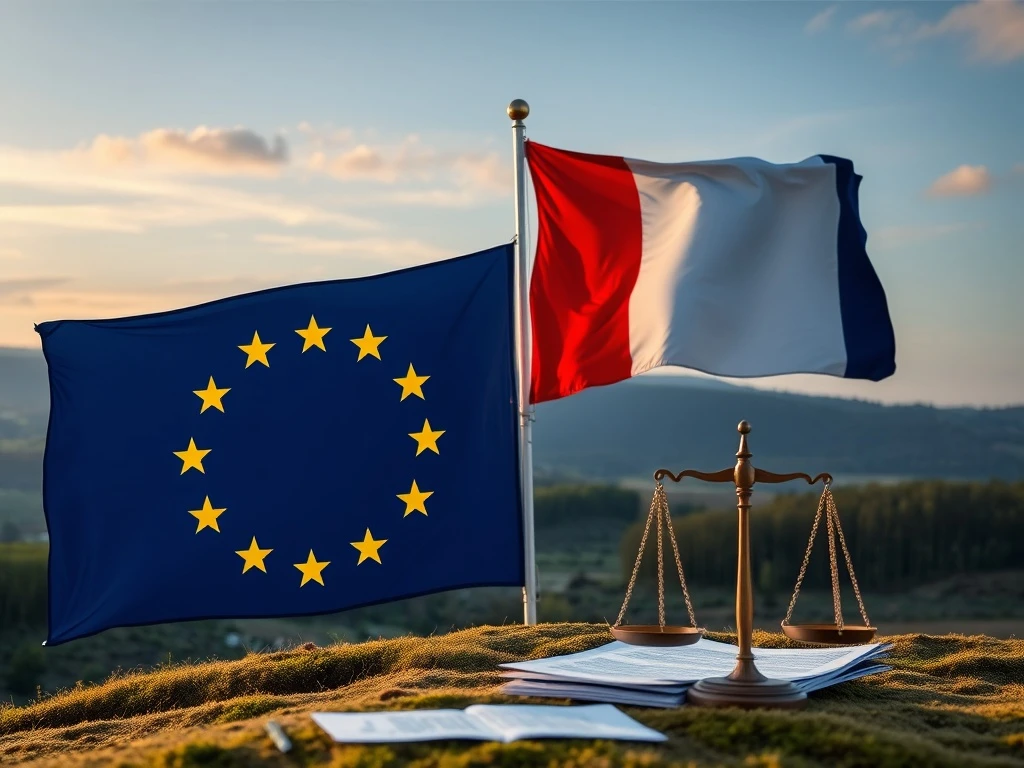Crucial EU Crypto Regulation Faces French Passporting Challenge

The landscape of EU crypto regulation faces a significant test. France is considering blocking cryptocurrency companies from operating within its borders using licenses issued by other European Union member states. This practice, known as ‘passporting,’ is a cornerstone of the EU’s single market. The potential move by France challenges the very essence of the Markets in Crypto-Assets Regulation (MiCA), designed to harmonize crypto oversight across the bloc. This development raises important questions about the future of crypto business operations in Europe.
France’s Stance on MiCA Passporting Under Scrutiny
France’s securities regulator, the Autorité des Marchés Financiers (AMF), is reportedly exploring a ban on MiCA passporting. This action would prevent crypto firms licensed in one EU nation from automatically operating in France. The AMF’s concern centers on regulatory arbitrage. Some crypto companies, they believe, seek licenses in more lenient EU jurisdictions. This strategy allows them to avoid stricter oversight found elsewhere. However, MiCA aimed to prevent such ‘forum shopping’ by creating a unified regulatory environment.
Legal experts hold differing views on the feasibility of France’s threat. Some believe blocking passporting is technically possible, but it involves considerable legal complexity. Others argue it directly contravenes MiCA’s core principles. Marina Markezic, executive director of the European Crypto Initiative (EUCI), states, “MiCA was designed to create one harmonised framework and give firms access to a single regulated market across the EU. That promise is now under pressure.” She notes that while blocking passporting might be technically feasible, it introduces significant legal challenges.
The Broader Impact on France Crypto Operations
This debate highlights growing tensions over MiCA enforcement. National authorities are taking divergent views on key supervisory questions. France recently joined Austria and Italy in calling for the Paris-based European Securities and Markets Authority (ESMA) to take over supervision of major crypto companies. This proposal would require legislative changes to MiCA itself. Such changes could reopen political negotiations. Furthermore, they might introduce fresh uncertainty for the industry. The future of France crypto operations thus remains uncertain for businesses relying on seamless EU access.
The AMF’s messaging may also serve as a warning. It signals France’s intent to scrutinize firms attempting to structure products under MiCA when they should fall under MiFID II. MiFID II is Europe’s Markets in Financial Instruments Directive II framework for securities markets. Regulators face a main challenge: ensuring crypto firms do not exploit ‘lighter regimes’ for financial instruments that should be classified as securities. This careful distinction is crucial for maintaining market integrity.
Addressing Potential Regulatory Arbitrage
The core issue driving France’s consideration is the fear of regulatory arbitrage. MiCA’s intention was to establish a level playing field. It sought to prevent companies from choosing the least burdensome jurisdiction. However, if some national regulators are perceived as more lenient, firms might gravitate towards them. This undermines the goal of a truly harmonized market. The current situation suggests that while MiCA provides a framework, its interpretation and enforcement can still vary significantly across member states.
Edwin Mata, a lawyer and co-founder of Brickken, offers a different perspective. He argues that legally, the AMF cannot block a duly MiCA-licensed entity from operating in France. Mata emphasizes, “MiCA is a regulation, not a directive, which means it applies directly and uniformly across all Member States.” He adds that the AMF can monitor conduct and raise supervisory concerns. They can also escalate cases to ESMA. However, they cannot impose unilateral barriers on companies licensed under any member state. This view suggests France’s actions might be more about strong messaging than outright legal blockade.
Implications for Crypto Firms Across the EU
This situation creates a complex environment for crypto firms. Companies that have invested in obtaining MiCA licenses now face potential uncertainty. The promise of a single market for crypto services could be jeopardized. This could force businesses to re-evaluate their expansion strategies within the EU. The differing interpretations highlight a broader challenge in implementing pan-European regulations. Ultimately, the debate underscores the need for clear and consistent enforcement mechanisms.
The outcome of this debate will shape the future of crypto regulation in Europe. It will determine how MiCA is interpreted and enforced. It also highlights the ongoing tension between national sovereignty and EU-wide harmonization. As the crypto industry matures, clear and predictable regulatory environments become even more critical for fostering innovation and investor confidence. All eyes are now on how the EU will navigate these internal challenges to its flagship crypto law.









